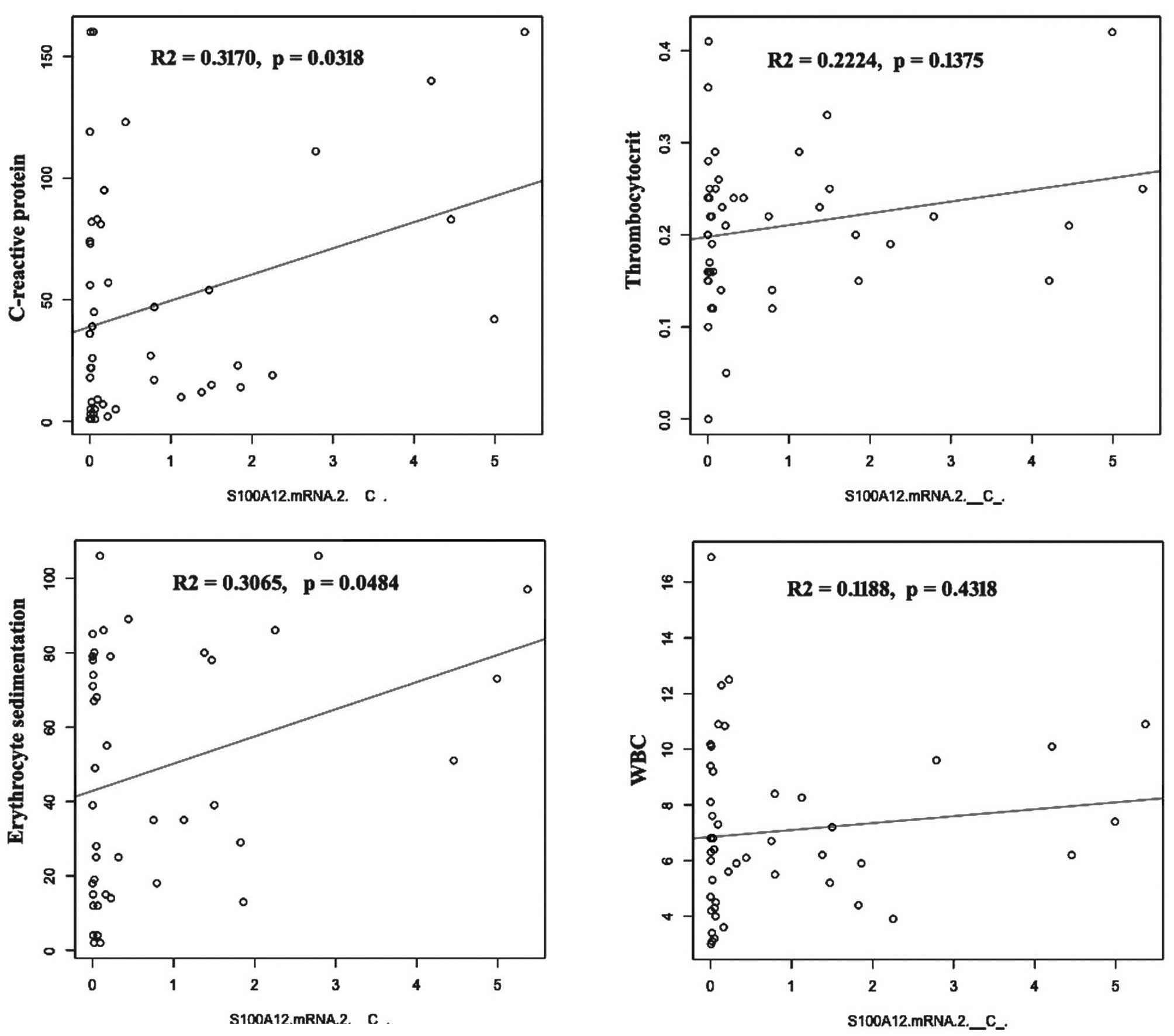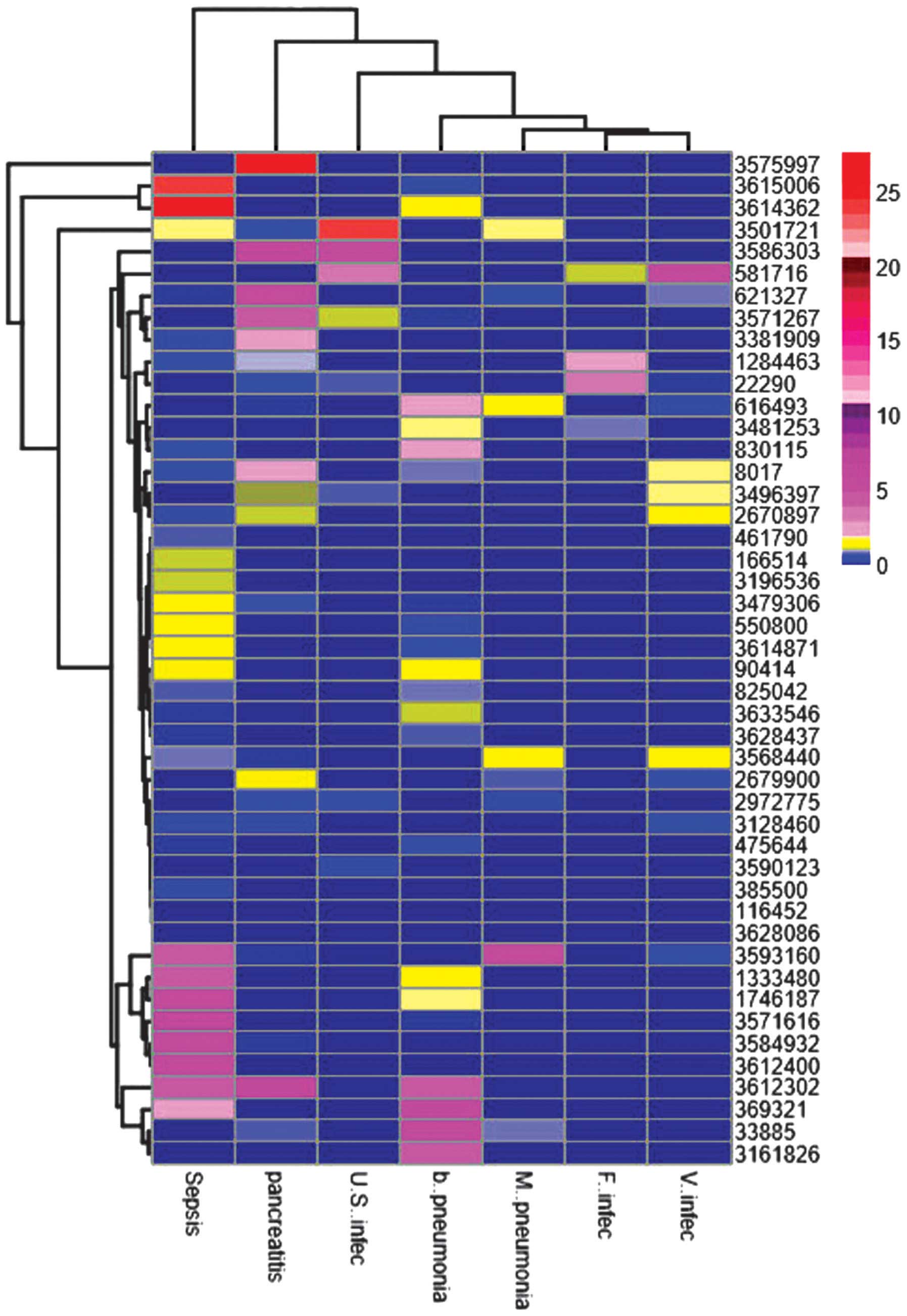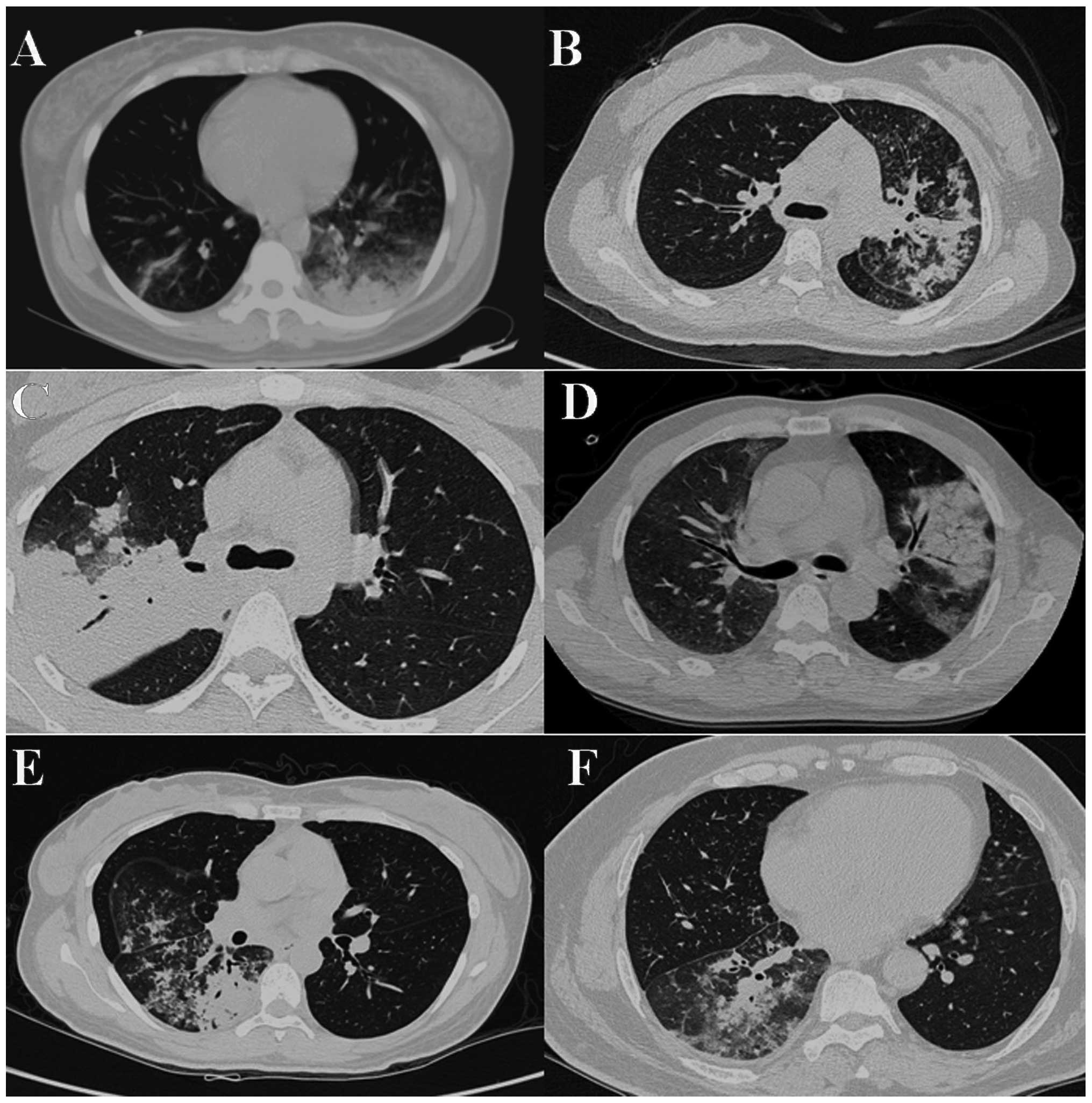|
1
|
Maletzki C, Bodammer P, Breitruck A and
Kerkhoff C: S100 proteins as diagnostic and prognostic markers in
colorectal and hepatocellular carcinoma. Hepat Mon.
12:e72402012.PubMed/NCBI
|
|
2
|
Schafer BW, Wicki R, Engelkamp D, Mattei
MG and Heizmann CW: Isolation of a YAC clone covering a cluster of
nine S100 genes on human chromosome 1q21: rationale for a new
nomenclature of the S100 calcium-binding protein family. Genomics.
25:638–643. 1995. View Article : Google Scholar : PubMed/NCBI
|
|
3
|
Yamamura T, Hitomi J, Nagasaki K, et al:
Human CAAF1 gene - molecular cloning, gene structure, and
chromosome mapping. Biochem Biophys Res Commun. 221:356–360. 1996.
View Article : Google Scholar : PubMed/NCBI
|
|
4
|
Roth J, Vogl T, Sorg C and Sunderkotter C:
Phagocyte-specific S100 proteins: a novel group of proinflammatory
molecules. Trends Immunol. 24:155–158. 2003. View Article : Google Scholar : PubMed/NCBI
|
|
5
|
Guignard F, Mauel J and Markert M:
Identification and characterization of a novel human neutrophil
protein related to the S100 family. Biochem J. 309:395–401.
1995.PubMed/NCBI
|
|
6
|
Marti T, Erttmann KD and Gallin MY:
Host-parasite interaction in human onchocerciasis: identification
and sequence analysis of a novel human calgranulin. Biochem Biophys
Res Commun. 221:454–458. 1996. View Article : Google Scholar : PubMed/NCBI
|
|
7
|
Ryckman C, Robichaud GA, Roy J, Cantin R,
Tremblay MJ and Tessier PA: HIV-1 transcription and virus
production are both accentuated by the proinflammatory
myeloid-related proteins in human CD4+ T lymphocytes. J Immunol.
169:3307–3313. 2002. View Article : Google Scholar : PubMed/NCBI
|
|
8
|
Moroz OV, Antson AA, Dodson GG, et al:
Crystallization and preliminary X-ray diffraction analysis of human
calcium-binding protein S100A12. Acta Crystallogr D Biol
Crystallogr. 56:189–191. 2000. View Article : Google Scholar : PubMed/NCBI
|
|
9
|
Ilg EC, Troxler H, Burgisser DM, et al:
Amino acid sequence determination of human S100A12 (P6, calgranulin
C, CGRP, CAAF1) by tandem mass spectrometry. Biochem Biophys Res
Commun. 225:146–150. 1996. View Article : Google Scholar : PubMed/NCBI
|
|
10
|
Cole AM, Kim YH, Tahk S, et al:
Calcitermin, a novel antimicrobial peptide isolated from human
airway secretions. FEBS Lett. 504:5–10. 2001. View Article : Google Scholar : PubMed/NCBI
|
|
11
|
Filipek A, Jastrzebska B, Nowotny M and
Kuznicki J: CacyBP/SIP, a calcyclin and Siah-1-interacting protein,
binds EF-hand proteins of the S100 family. J Biol Chem.
277:28848–28852. 2002. View Article : Google Scholar : PubMed/NCBI
|
|
12
|
Morbini P, Villa C, Campo I, Zorzetto M,
Inghilleri S and Luisetti M: The receptor for advanced glycation
end products and its ligands: a new inflammatory pathway in lung
disease. Mod Pathol. 19:1437–1445. 2006.PubMed/NCBI
|
|
13
|
Kikkawa T, Sato N, Kojika M, et al:
Significance of measuring S100A12 and sRAGE in the serum of sepsis
patients with postoperative acute lung injury. Dig Surg.
27:307–312. 2010. View Article : Google Scholar : PubMed/NCBI
|
|
14
|
Hofmann MA, Drury S, Fu C, et al: RAGE
mediates a novel proinflammatory axis: a central cell surface
receptor for S100/calgranulin polypeptides. Cell. 97:889–901. 1999.
View Article : Google Scholar : PubMed/NCBI
|
|
15
|
Moroz OV, Antson AA, Murshudov GN, et al:
The three-dimensional structure of human S100A12. Acta Crystallogr
D Biol Crystallogr. 57:20–29. 2001. View Article : Google Scholar : PubMed/NCBI
|
|
16
|
Moroz OV, Antson AA, Dodson EJ, et al: The
structure of S100A12 in a hexameric form and its proposed role in
receptor signalling. Acta Crystallogr D Biol Crystallogr.
58:407–413. 2002. View Article : Google Scholar : PubMed/NCBI
|
|
17
|
Machelska H, Schopohl JK, Mousa SA, Labuz
D, Schafer M and Stein C: Different mechanisms of intrinsic pain
inhibition in early and late inflammation. J Neuroimmunol.
141:30–39. 2003. View Article : Google Scholar : PubMed/NCBI
|
|
18
|
Stein C, Schafer M and Machelska H:
Attacking pain at its source: new perspectives on opioids. Nat Med.
9:1003–1008. 2003. View
Article : Google Scholar : PubMed/NCBI
|
|
19
|
Medzhitov R: Origin and physiological
roles of inflammation. Nature. 454:428–435. 2008. View Article : Google Scholar : PubMed/NCBI
|
|
20
|
Spiekerkoetter E, Guignabert C, de Jesus
Perez V, et al: S100A4 and bone morphogenetic protein-2
codependently induce vascular smooth muscle cell migration via
phospho-extracellular signal-regulated kinase and chloride
intracellular channel 4. Circ Res. 105:639–647. 2009. View Article : Google Scholar : PubMed/NCBI
|
|
21
|
Dabritz J, Langhorst J, Lugering A, et al:
Improving relapse prediction in inflammatory bowel disease by
neutrophil-derived S100A12. Inflamm Bowel Dis. 19:1130–1138. 2013.
View Article : Google Scholar : PubMed/NCBI
|
|
22
|
Hofmann BMA, Heydemann A, Gawdzik J,
Shilling RA and Camoretti-Mercado B: Transgenic expression of human
S100A12 induces structural airway abnormalities and limited lung
inflammation in a mouse model of allergic inflammation. Clin Exp
Allergy. 41:878–889. 2011. View Article : Google Scholar
|
|
23
|
van Zoelen MA, Achouiti A and van der Poll
T: RAGE during infectious diseases. Front Biosci (Schol Ed).
3:1119–1132. 2011. View
Article : Google Scholar
|
|
24
|
Batliwalla FM, Baechler EC, Xiao X, et al:
Peripheral blood gene expression profiling in rheumatoid arthritis.
Genes Immun. 6:388–397. 2005. View Article : Google Scholar : PubMed/NCBI
|
|
25
|
Das D, Gawdzik J, Dellefave-Castillo L,
McNally EM, Husain A, et al: S100A12 expression in thoracic aortic
aneurysm is associated with increased risk of dissection and
perioperative complications. J Am Coll Cardiol. 60:775–785. 2012.
View Article : Google Scholar : PubMed/NCBI
|
|
26
|
Brinar M, Cleynen I, Coopmans T, et al:
Serum S100A12 as a new marker for inflammatory bowel disease and
its relationship with disease activity. Gut. 59:1728–1729. 2010.
View Article : Google Scholar : PubMed/NCBI
|
|
27
|
Dabritz J, Jenke A, Wirth S and Foell D:
Fecal phagocyte-specific S100A12 for diagnosing necrotizing
enterocolitis. J Pediatr. 161:1059–1064. 2012. View Article : Google Scholar : PubMed/NCBI
|
|
28
|
Nakashima M, Sakai T, Hiraiwa H, et al:
Role of S100A12 in the pathogenesis of osteoarthritis. Biochem
Biophys Res Commun. 422:508–514. 2012. View Article : Google Scholar : PubMed/NCBI
|
|
29
|
Foell D, Ichida F, Vogl T, et al: S100A12
(EN-RAGE) in monitoring Kawasaki disease. Lancet. 361:1270–1272.
2003. View Article : Google Scholar : PubMed/NCBI
|
|
30
|
Foell D, Kucharzik T, Kraft M, et al:
Neutrophil derived human S100A12 (EN-RAGE) is strongly expressed
during chronic active inflammatory bowel disease. Gut. 52:847–853.
2003. View Article : Google Scholar : PubMed/NCBI
|
|
31
|
Ginocchio CC, Lotlikar M, Falk L, et al:
Clinical performance of the 3M Rapid Detection Flu A+B Test
compared to R-Mix culture, DFA and BinaxNOW Influenza A&B Test.
J Clin Virol. 45:146–149. 2009. View Article : Google Scholar : PubMed/NCBI
|
|
32
|
Rongeat N, Ledroit S, Chauvet L, et al:
Automatic cytometric device using multiple wavelength excitations.
J Biomed Opt. 16:0570062011. View Article : Google Scholar : PubMed/NCBI
|
|
33
|
Livak KJ and Schmittgen TD: Analysis of
relative gene expression data using real-time quantitative PCR and
the 2(-Delta Delta C(T)) method. Methods. 25:402–408. 2001.
View Article : Google Scholar
|
|
34
|
Braun RP and Lee JS: Immunogenic duplex
nucleic acids are nuclease resistant. J Immunol. 141:2084–2089.
1988.PubMed/NCBI
|
|
35
|
Smyth GK: Limma: linear models for
microarray data. Bioinformatics and Computational Biology Solutions
using R and Bioconductor. Gentleman R, Carey V, Dut SR, Irizarry WH
and Huber W: Springer; New York: pp. 397–420. 2005, View Article : Google Scholar
|
|
36
|
Pradeep AR, Martande SS, Singh SP, et al:
Correlation of human S100A12 (EN-RAGE) and high-sensitivity
C-reactive protein as gingival crevicular fluid and serum markers
of inflammation in chronic periodontitis and type 2 diabetes.
Inflamm Res. 63:317–323. 2014. View Article : Google Scholar : PubMed/NCBI
|
|
37
|
Dellinger RP, Levy MM, Rhodes A, et al:
Surviving Sepsis Campaign: international guidelines for management
of severe sepsis and septic shock, 2012. Intensive Care Med.
39:165–228. 2013. View Article : Google Scholar : PubMed/NCBI
|
|
38
|
Gaïni S, Koldkjaer OG, Pedersen C and
Pedersen SS: Procalcitonin, lipopolysaccharide-binding protein,
interleukin-6 and C-reactive protein in community-acquired
infections and sepsis: a prospective study. Critical care.
10:R532006. View
Article : Google Scholar
|
|
39
|
Ballou SP and Kushner I: C-reactive
protein and the acute phase response. Adv Intern Med. 37:313–336.
1992.PubMed/NCBI
|
|
40
|
Pietzsch J and Hoppmann S: Human S100A12:
a novel key player in inflammation. Amino Acids. 36:381–389. 2009.
View Article : Google Scholar
|


















